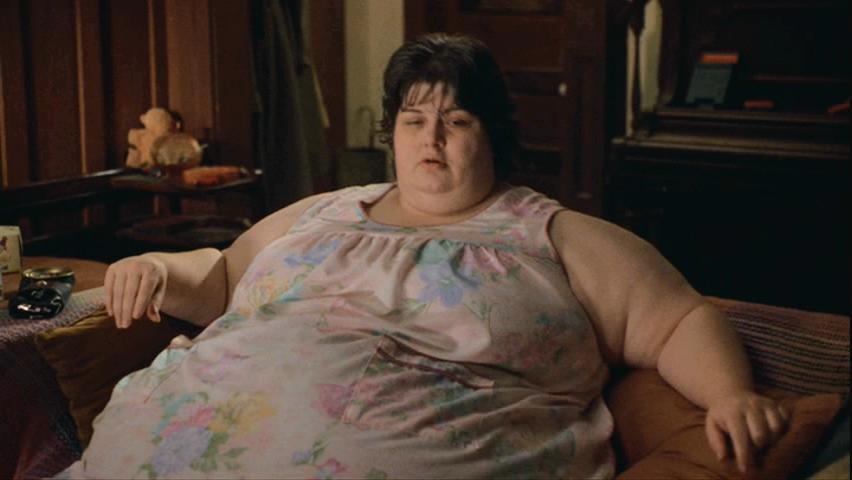In a series called Mondo Bullshittio, let’s talk about some of the most glaring hypocrisies in pop culture… and all that it affects.
The 90s. A happy-go-lucky time (though not for Kosovo) when bullying was still “allowed” (not that it doesn’t go on now, but the bully is more likely to become the bullied in the tar and feathering game of political correctness). Regardless of one’s age, or even title. Like that of Mother. More specifically, like Gilbert Grape’s mother, Bonnie (Darlene Cates), in 1993’s What’s Eating Gilbert Grape? (strangely, directed by Lasse Hallström, the man responsible for most of ABBA’s music video oeuvre). As a morbidly obese woman who hasn’t left the house in the seventeen years since her husband committed suicide, Bonnie’s depression coma results in sitting idly on the couch as she spends the day eating and watching TV. These are her numbing agents, the way in which she copes with a life that has become so unreal that all she can do is try to escape to a better non-reality than the one she’s presently in.
The way in which many people in quarantine (the ones who like to be overly hyperbolic in saying they’ve already watched everything on Netflix while only being in quarantine for barely two weeks) are dealing with their own unpleasant existence. The truth of which is too much to bear for even the least feeble-minded among us. And while Bonnie’s self-quarantine might be for reasons not pertaining to a killer virus on the loose and according government-enforced lockdowns, her slippery slope to becoming too large even to lumber about is not unlike what most people are or will soon be experiencing. For let us get down to the brass tacks of what it means (for the vast majority) to be human: having a purpose. A reason to get up in the morning. For the bulk of the population, this boils down to the rote motions of going to work (which is precisely why America’s entire sense of identity just got gut-punched).
This, in turn, spurs the reasoning that one ought to wash themselves, get dressed and do everything else necessary to present their body in the best possible light to their fellow man. For, try as we might to tell ourselves otherwise, most of what we do is for the benefit of “other people.” Impressing them, appearing a certain way to them–generally kowtowing to the herd mentality. Stripping this piece away from daily human existence means all those self-imposed rules go out the window. All of the sudden, there is no “reason” to do anything. Which just goes to show how little humans value the self despite the ironic level of selfishness apparent on a regular basis in a capitalist society.
All at once, the usually manageable weight of existence becomes a crushing one, so you find any way possible to desensitize from it (by becoming literally weighty yourself). To pass the hours in a manner that doesn’t require too much mental presence, but just enough to keep your brainwaves mildly functional. Like the caged animal that is Bonnie, we sit and wait. Not knowing, exactly, for what. But for something. Some kind of change that would make leaving the cocoon of one’s home worthwhile. Because the more you start to examine the potential motives for leaving the house–exercise, mainly–the less appealing it sounds.
You start to get in your own head, seething, “What’s the point? What is actually the point of bothering with any environment outside of these four walls? No one ever needs to see me again.” Bonnie, of course, was unwittingly ahead of her time on this front, not knowing from her vantage point in the 90s that we would all ultimately become projections of ourselves via the avatar of social media.
So accustomed to the limited confines of her home, Bonnie is truly horrified when her oldest son and default caretaker of everyone in the family, Gilbert (Johnny Depp), decides to shed his embarrassment of her and introduce her to his new girlfriend, Becky (Juliette Lewis). It prompts her to try to hide in shame, crying, “No!” at the prospect of being seen by any outsiders. She was already recently mocked in the public space after the extraordinary circumstance of having to go to the police station to defend her mentally challenged youngest son, Arnie (Leonardo DiCaprio). Another verbal lashing would be too much for her to bear.
For being locked inside for so long makes one more sensitive than usual, unhabituated to the opinions and beratings of others (which is also why so-called “life after lockdown” will cause a separate emotional trauma in and of itself as one readjusts to “in real life” human cruelty). “I haven’t always been like this,” she offers as an excuse for her socially unacceptable appearance. The one that denotes a total loss of self-control in the face of no longer needing to surround oneself with humans, without their judgmental nature to keep one’s physical appearance in check. And yes, if Bonnie did have a social media account, she would be able to post perfectly passable photos thanks to the wonders of phone or computer manipulation. Ergo, she would’ve still allowed herself to get too rotund to actually be seen. After all, obesity is like financial ruin, it happens gradually, then suddenly.
But for anyone who might have made fun of Bonnie back then, there’s no doubt she’s the one laughing from beyond the grave now. Because who among us won’t need to be forklifted from our apartments if and when quarantine ever ends? Unless, of course, fate is kind enough to make us expire beforehand and kind enough still to allow someone to burn us so that no one ever sees just how damned huge we became while in lockdown. “She’s grotesque, don’t deny it,” Gilbert says to Becky. But then, what isn’t when you’re dealing with a society in decay?






















